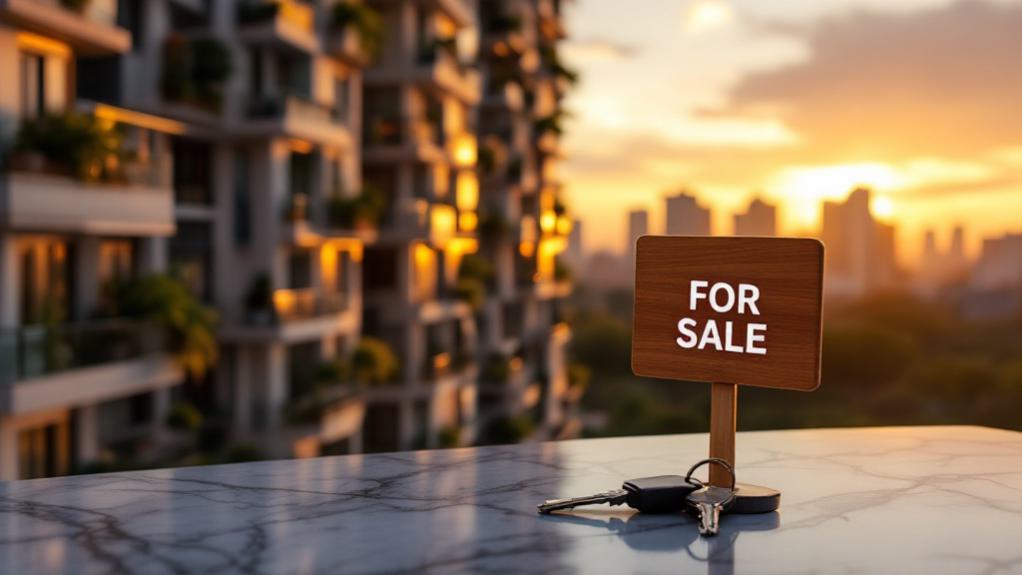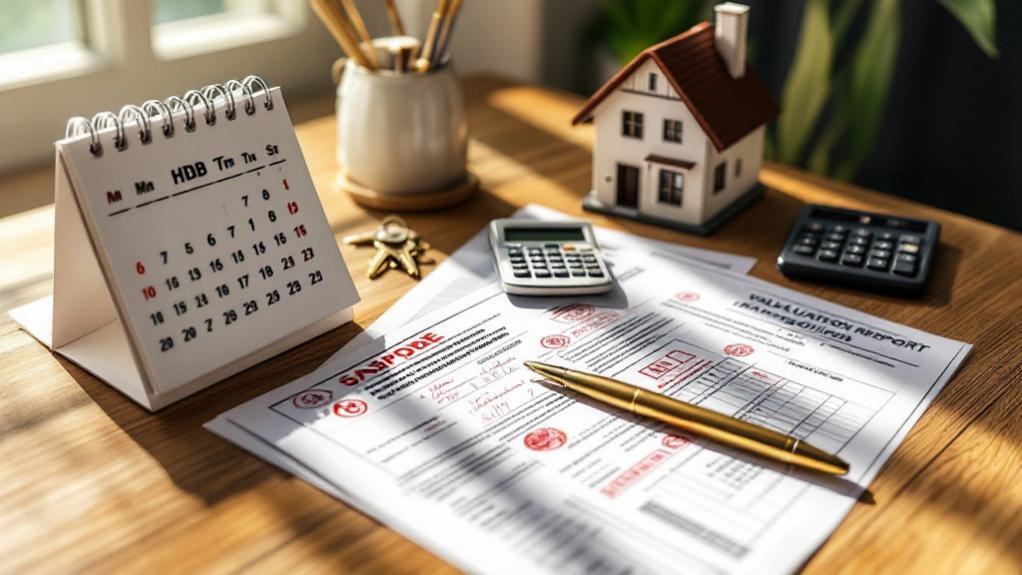The six key milestones in selling an HDB flat comprise the initial registration on the HDB Resale Portal, thorough financial planning, strategic property marketing, negotiation with potential buyers, Option to Purchase (OTP) issuance, and the completion appointment where ownership transfer occurs. Each phase requires meticulous attention to regulatory requirements and financial implications, from the mandatory 7-day cooling period to the completion appointment scheduled approximately 8 weeks after application acceptance. The subsequent sections elaborate on critical considerations for traversing these milestones efficiently.

While steering through the process of selling a Housing and Development Board (HDB) flat involves multiple administrative steps, homeowners must first register their intent to sell through the official HDB Resale Portal using Singpass authentication. This initial registration provides sellers with an instant eligibility assessment, access to Ethnic Integration Policy (EIP) quotas for their block, upgrading status information, and data on recent transaction prices in the vicinity—critical information for formulating an appropriate market strategy.
Following registration, sellers must calculate their estimated sale proceeds by determining the outstanding mortgage balance, factoring in Central Provident Fund (CPF) refunds with accrued interest, and accounting for property tax and utility bill settlements. Those who previously purchased subsidized flats may need to take into account applicable resale levies, which greatly impact the final cash proceeds available post-transaction. The selling intent registration is valid for 12 months and serves as the necessary first step before proceeding with the selling journey.
Accurate financial planning before selling your HDB flat requires analyzing mortgage balances, CPF refunds, taxes, and potential resale levies.
Marketing the property constitutes the next critical phase, with sellers having multiple channels at their disposal, including free listings on the HDB Flat Portal and commercial property platforms such as PropertyGuru. The Resale Flat Listing (RFL) service offers a reliable marketplace for connecting with potential buyers. Sellers should also be aware of the HDB’s classification framework for flats (Standard, Plus, and Prime) which may affect buyer eligibility and resale conditions. Professional photography and strategic pricing based on comparative market data often enhance the property’s marketability, while engagement of a property agent remains optional but potentially beneficial for maneuvering complex negotiations.
The negotiation process typically involves arranging viewings, discussing terms with potential buyers, and evaluating offers beyond mere price considerations.
Once terms are agreed upon, sellers must observe the mandatory 7-day cooling period before granting the Option to Purchase (OTP), which secures an option fee of up to $1,000 and provides buyers with 21 days to exercise their option.
Upon the buyer’s decision to exercise the OTP, both parties must submit a joint resale application within 7 days, accompanied by an administrative fee ranging from $40 to $80.
After HDB’s acceptance of the application, sellers must prepare for the completion appointment, which occurs approximately 8 weeks later. During this final milestone, sellers sign conveyancing documents, receive the balance payment, and formally transfer property ownership by handing over keys to the buyer.
Frequently Asked Questions
Can I Sell My Flat During the Minimum Occupation Period (MOP)?
HDB flat owners cannot, under standard regulations, sell their property during the Minimum Occupation Period (MOP), which typically spans five years from key collection date.
However, exceptions exist for specific circumstances, including divorce, financial hardship, medical necessities, emigration, or death of a sole owner or essential occupier.
These exceptional cases require formal application to HDB, thorough documentation, and official approval before any sale transaction can proceed.
How Do I Determine the Market Value of My HDB Flat?
To determine an HDB flat’s market value, homeowners should analyze recent transaction data from HDB’s website, filtering by comparable parameters such as flat type, town, and floor area.
Multiple online valuation tools, including SRX X-Value and HDBestimate, can provide automated estimates based on thorough algorithms.
Professional property agents can offer Comparative Market Analysis (CMA) with insights on local market conditions.
Property condition, proximity to amenities, remaining lease years, and unique attributes greatly impact the final valuation determination.
What Fees and Taxes Are Involved When Selling an HDB Flat?
Sellers of HDB flats must account for several mandatory fees and taxes.
Administrative fees range from $40-$80 depending on flat size, while legal conveyancing fees start at a minimum of $20 based on the Conveyancing Fees Rules 2002.
Additional financial obligations include pro-rated property tax, service and conservancy charges (S&CC) of $20-$90, outstanding maintenance fees, and potential Seller’s Stamp Duty of 4-12% if the property is sold within three years of purchase.
Can I Sell My Flat if I Have an Outstanding Housing Loan?
Yes, HDB flat owners can sell their property with outstanding housing loans, as this is a standard practice in Singapore’s resale market.
The outstanding loan balance is automatically deducted from the sale proceeds during the conveyancing process, with HDB loans being settled directly through the transaction while bank loans require coordination with the respective financial institution.
The settlement of the loan, including accrued interest, must be completed before the property transfer can be finalized.
What Happens to My CPF Funds After Selling My Flat?
After selling a flat, CPF funds used for the property must be refunded to the seller’s CPF accounts, including the principal amount, accrued interest, and any housing grants received.
For sellers below 55, refunds are credited to their Ordinary Account; those 55 and above will have refunds first topping up their Retirement Account to the Full Retirement Sum, with remaining amounts staying in the Ordinary Account.
Refunded funds can support future property purchases, subject to applicable regulations.





